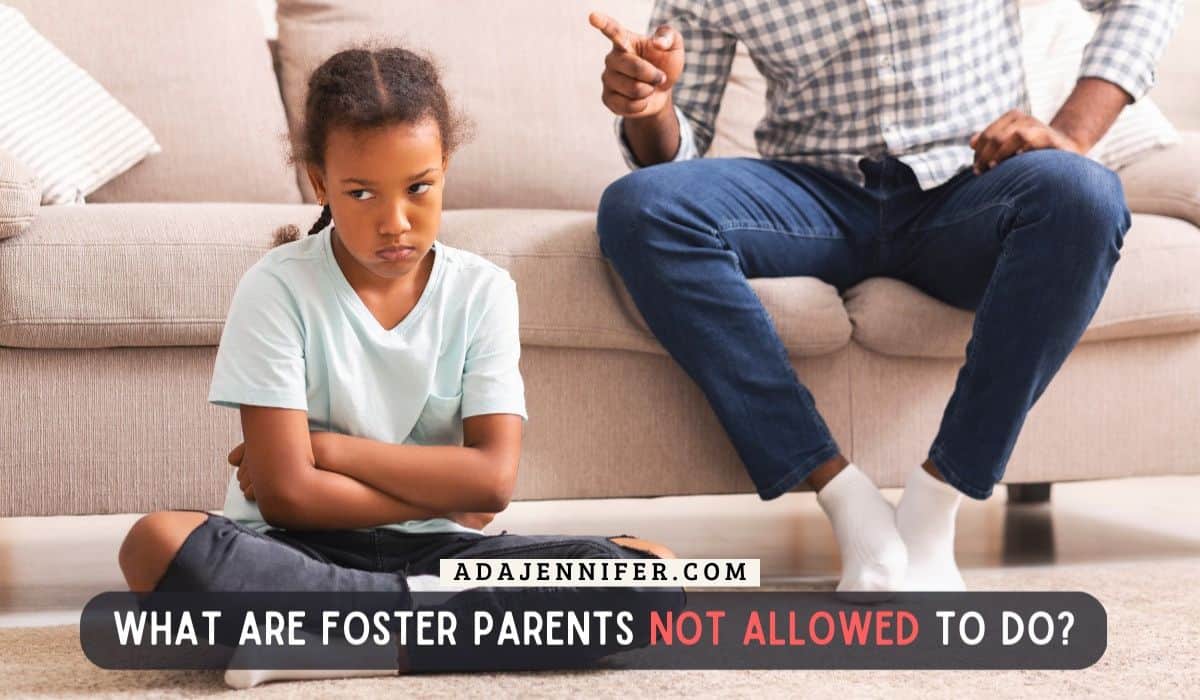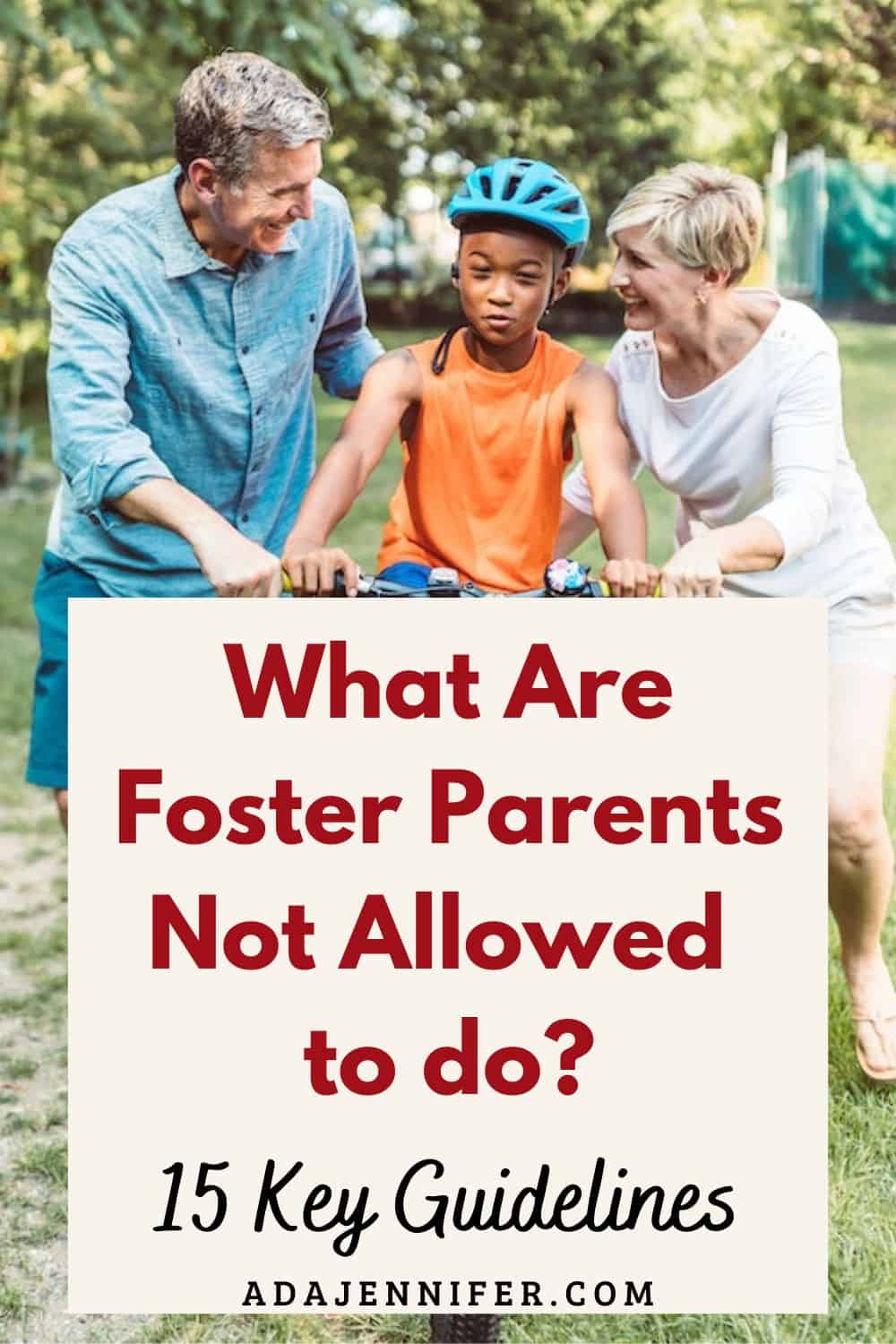What Are Foster Parents Not Allowed To Do- 15 Key Guidelines

Are you considering becoming a foster parent? If yes, it’s necessary to understand the rules and regulations that come with this significant role. More importantly, you should know the answer to this question: What are foster parents not allowed to do?
While it can be a truly rewarding experience, foster parenting also comes with certain restrictions and fostering requirements. Foster parents have a huge responsibility of providing a safe and loving environment for their foster children, and breaking these rules can have serious consequences.
In this article, we will explore:
- What is Foster Parenting?
- What are foster parents not allowed to do?
- Rules for foster parents.
- What happens if a foster parent breaks the rules?
- Foster care requirements.
- Qualification to be a foster parent.
- What reasons can they deny foster care?
Without further ado, let’s begin!
Related Article—Empowering Affirmations every child needs to hear!
What is Foster Parenting?
Foster parenting is a form of caregiving where individuals or families provide temporary care for children who cannot live with their biological parents!
It is a selfless act of love and compassion that can make a world of difference in the life of a child. It can surely be a beautiful experience that can bring joy, laughter, and a sense of purpose to the foster parents’ lives.
Additionally, it provides a nurturing home environment for children who are in need of love, care, and support. However, with this great responsibility comes a set of foster care rules and regulations that parents must follow.
Foster rules are put in place to ensure the safety and well-being of the foster children. This takes us to our next point of discussion, what are foster parents not allowed to do?
Related Article—10 Tips and tricks for getting kids to sleep at night!
What are Foster Parents not allowed to do?
There are several things you cannot do as foster parents that you could normally do with your biological children. Being temporary parents, you are not allowed to engage in any activity or behavior that may negatively impact your foster children’s well-being and safety!
Here is a comprehensive list of things foster parents can’t do:
1. Physically discipline a foster child.

As a foster parent, it is crucial to remember that physical discipline is strictly prohibited. This means that you cannot hit, spank, slap, or physically harm a foster child in any way.
Examples of physical discipline that are not allowed:
– Slapping a child on the face or any other part of their body as a form of punishment.
– Spanking a child with an object like a belt, wooden spoon, or any other instrument.
– Physically restraining a child in a way that causes discomfort or harm.
– Using physical force to make a child comply with your instructions or demands.
Remember, physical discipline is not only illegal, but it can also cause long-lasting emotional and physical trauma to the child. You must find alternative ways to discipline your children that are safe and non-violent!
This shouldn’t only be applicable to foster parenting. It is highly crucial to follow positive parenting in the case of your biological children as well!
2. Neglect or abuse a foster child in any way.
Neglecting or abusing a foster child is strictly restrained and can lead to serious consequences, like immediate termination of your foster care license. Being a foster parent, it is your responsibility to provide a safe and nurturing environment for the foster child.
Examples of neglect or abuse that are not allowed:
– Neglecting to provide a foster child with proper nutrition, healthcare, clothing, and shelter.
– Leaving a foster child unsupervised for an extended period of time.
– Failing to provide a foster child with emotional support, attention, and care.
– Verbally or emotionally abusing a foster child by belittling, insulting, or threatening them.
– Engaging in sexual misconduct or exploitation of a foster child.
Remember, your primary responsibility is to provide a safe and supportive aura for the child. Any form of neglect or abuse can have rigid consequences on the child’s physical, emotional, and mental well-being.
Furthermore, if you suspect that a child is being neglected or abused, it is your duty to report it to the appropriate authorities immediately!
Related Post—30+ Things to do when bored and stuck at home with kids!
3. Deny a foster child medical treatment or necessary medication.

One of the most critical responsibilities of a foster parent is to ensure that the child in their care receives proper medical attention and care!
This means you must never deny a foster child medical treatment or necessary medication. Doing so can pose a threat to the child’s physical and mental health!
What are foster parents not allowed to do?
– Refusing to take a foster child to the doctor or dentist when they need care, even for routine check-ups.
– Failing to administer medication as prescribed by a healthcare provider, which can lead to serious health consequences for the child.
– Ignoring or dismissing the medical needs of a foster child, which can cause long-term health problems.
Keep in mind, providing proper medical care for a foster child is not only a legal requirement but a moral obligation. You must ensure that every child under your care has access to the medical treatment they need to stay healthy and thrive!
4. Give a foster child any medication without a doctor’s approval.
Administering medication to a foster child without a doctor’s approval is a serious violation of foster care rules!
As a foster parent, you should never give a child any medication unless it has been prescribed by a doctor or healthcare provider. This includes over-the-counter medications, vitamins, and supplements.
Even if you think a medication might help the child with a particular issue, you should not give it to them without consulting with a doctor first. Doing so can lead to health complications, including allergic reactions, drug interactions, and other negative side effects.
It is important to prioritize the safety and well-being of the child in your care. If you have concerns about a foster child’s health or medication, talk to their healthcare provider or caseworker to get the guidance you need to make informed decisions!
Related Post—How to effectively discipline a toddler?
5. Invade a foster child’s privacy without a valid reason.
Respecting a foster child’s privacy is crucial in building trust and maintaining a healthy relationship!
Invading their privacy without a valid reason is not allowed and can result in several complications. Here are some things foster parents can’t do in terms of privacy invasion:
– Reading a foster child’s diary or personal journal without their permission.
– Listening in on a foster child’s phone calls or conversations with friends or family members.
– Going through a foster child’s personal belongings or room without their knowledge or consent.
Even though it is essential to ensure the safety of the child you have fostered, you also need to respect their personal space and privacy.
If you have concerns about their behavior, talk to their caseworker. Remember, building a trusting and respectful relationship with a foster child can make a significant difference in their well-being and development!
6. Allow unsupervised visitation with unknown individuals

One of the fundamental responsibilities of a foster parent is to provide a safe and secure environment for the child in their care!
Allowing unsupervised visitation without concerning with the child care agency is a serious violation of foster care rules, as it can put the child at risk of harm or danger.
What are foster parents not allowed to do?
– Allowing a foster child to go on a playdate or sleepover at an unfamiliar home without proper background checks or supervision.
– Permitting a foster child to spend time with strangers or acquaintances without adult supervision.
– Allowing a foster child to have unmonitored access to the internet or social media where they may encounter strangers online.
You need to establish clear boundaries and rules around visitation and social interactions to protect the child’s well-being. Plus, always prioritize the child’s safety and be sure to communicate any concerns or questions with the parties involved.
Related Post—How to teach a child respect?
7. Make decisions regarding a foster child’s education without consulting with the child’s caseworker!
Education is a crucial aspect of any child’s life! This is why it’s important for foster parents to understand that they cannot make decisions about a child’s education on their own.
You must consult with the child’s caseworker or school officials before making any educational decisions. This includes decisions related to:
– Changing a child’s school without proper authorization or consultation.
– Refusing to allow a child to participate in educational activities or programs.
– Withholding educational information or opportunities from the child.
Foster parents must work closely with the school officials and ensure that the child is receiving the best possible education and support!
By collaborating with the child’s educational team, foster parents can help create a positive and enriching learning environment that supports the child’s academic success.
Remember, every child is unique and has different educational needs. So it’s of utmost importance to consult with the appropriate professionals before making any decisions that could impact the child’s education!
8. Allow a foster child to drive without a valid driver’s license and insurance.
Foster parents should be aware that allowing a child to drive without a valid driver’s license is not only illegal, but also extremely dangerous.
Foster children may not have the necessary experience or skills to safely operate a vehicle, which could result in serious injury or even death. So you must ensure that the child follows all the rules and regulations regarding driving, including obtaining a valid driver’s license and insurance coverage.
This will not only help protect the child but also protect the foster parent from potential legal and financial liability. It’s important to ensure that foster children are properly trained and licensed before getting behind the wheel.
9. Use a foster child’s funds or assets for personal gain!
One of the most important responsibilities of foster parents is to manage a foster child’s finances and assets properly!
This includes any funds or assets provided by the government or other sources for the child’s care and well-being. Misusing or mishandling this money is a serious violation and can result in legal and financial problems for the foster parent.
You need to remember that these funds are not for your personal use, and should only be used to meet the child’s needs. What are foster parents not allowed to do?
- You cannot use the money to pay personal bills,
- buy personal items,
- or invest in personal projects.
This could result in a breach of trust and jeopardize the welfare of the child!
For instance, if a foster child receives a settlement or inheritance, the funds must be managed carefully and used only for the child’s benefit. This includes paying for education, medical bills, or other necessary expenses.
Also, the foster parent must be transparent with the child’s caseworker and keep accurate records of all expenditures!
10. Discriminate against a foster child.

No matter the color of their skin, the accent in their speech, or the faith they follow, every foster child deserves to be treated with respect and dignity!
Discriminating against a child based on their race, ethnicity, gender, sexual orientation, or religion is not only prohibited, it’s downright unacceptable.
Foster parents must embrace diversity and create a safe and welcoming environment for their foster children, no matter their background. They must be open-minded, non-judgmental, and willing to provide a safe and accepting home for all children.
By doing so, they can help foster children to heal and thrive. And also provide them with the love, support, and stability they need to overcome the challenges they have faced in their young lives.
Related Article—How to deal with a disrespectful teen?
11. Allow a foster child to engage in illegal or dangerous activities.
While it’s natural to give foster children the freedom to explore their interests and hobbies, allowing them to engage in illegal or dangerous activities is out of the rules.
Foster children are already vulnerable, having experienced trauma or abuse, and putting them in harm’s way is the last thing they need.
By allowing them to participate in illegal or dangerous activities, you’re not only breaking the law, but you’re also endangering their lives and possibly the lives of others.
It’s essential to set a positive example for foster children by following the rules and making responsible decisions. Here are some things foster parents can’t do:
a) Use drugs or alcohol: Experimenting with drugs or alcohol is a common teenage experience. However, foster children may have a history of substance abuse or addiction.
This is why you must provide a drug-free environment and ensure that they receive the appropriate support and treatment if needed.
b) Engage in criminal activity: It’s essential to discourage any illegal behavior, including theft, vandalism, or violence. You cannot allow a foster child to participate in gang activity or other criminal enterprises.
c) Participate in dangerous sports or activities: It’s your responsibility to ensure that foster children are safe and protected. Therefore, you cannot allow them to participate in high-risk sports or dangerous stunts.
d) Associate with dangerous or harmful people: You must ensure that foster children are not exposed to individuals who may harm or exploit them.
e) Access dangerous or inappropriate materials: It’s crucial to supervise the materials and media that foster children have access to. Ensure that they do not view inappropriate content, such as violent video games or pornography.
As a foster parent, you are required to provide a stable and secure environment for foster children. One that promotes growth, development, and a sense of belonging.
12. Leave a foster child unsupervised.

Being a foster parent comes with great responsibility, including the duty to keep your foster child safe and well-cared for at all times!
However, leaving a foster child unsupervised for an extended period of time is a huge no-no. Imagine the fear and anxiety a child would feel being alone and unsure of what to do.
Picture this: You’re a foster parent and you’ve got a ton of errands to run. You’re thinking of leaving your foster child at home for a few hours while you’re out and about.
Hold up! Before you make any decisions, remember that a child may easily indulge in self-harming activities. For example, let’s say the child gets hungry when you’re not present and decides to cook something.
What if they cut themselves or leave the gas open after cooking? There are several ways a child can hurt themselves when nobody is around. So, never leave a foster child unsupervised for a long time.
13. Alter their appearance
Foster parents must not alter a foster child’s appearance without proper consent or a valid reason. Altering a child’s appearance can lead to emotional and psychological harm, which can affect them for a lifetime.
Some examples of altering a child’s appearance include, but are not limited to,
- changing their hair color or style,
- tattooing their body,
- piercing ears without their consent,
- or forcing them to wear clothing that they are uncomfortable with.
Foster children need to feel safe and secure, and altering their appearance without a valid reason can damage their trust and sense of security.
Related Article—How to unspoil a child?
14. Share their faces on social media
One important rule to follow is to never share the foster child’s face or any identifying information on social media. This includes posting photos or videos that clearly show their face or any personal information that could potentially put the child at risk.
Some examples of what are foster parents not allowed to do include:
– Posting a photo of the child on your Facebook or Instagram account without blurring out their face or obtaining permission from the child’s caseworker.
– Sharing information about the child’s location, such as where they go to school or where they will be staying for the weekend.
– Tagging the child in photos or posts that reveal their identity.
Remember, foster children often come from difficult and traumatic situations, and they deserve the right to privacy and safety just like any other child.
15. Co-sleeping
Co-sleeping arrangements can be defined as sharing the same bed or sleeping space with a child. While this may seem like a harmless way to bond with a foster child, it can actually lead to a number of problems!
For example, it can blur the lines of appropriate physical boundaries, and may even lead to accusations of abuse or neglect.
To prevent these types of situations from occurring, it’s important to establish clear and appropriate boundaries with your foster children. This includes providing a separate sleeping space for the child, and ensuring that they feel safe and comfortable in their own environment!
These were the 15 things foster parents can’t do. If you are a soon-to-be foster parent, or a foster child, you must be aware of rules for fostering!
Rules for Foster Parents

Are you considering becoming a foster parent? If so, there are certain rules and requirements to be a foster parent!
But don’t worry, these rules for foster parents are not meant to be overwhelming or daunting. In fact, they are designed to ensure that you and your foster child have the best possible experience together.
So, what are the rules to become a foster parent?
a) Providing a stable and consistent environment for your foster child, including regular routines and expectations for behavior.
b) Creating a safe and secure home environment, including childproofing and monitoring.
c) Meeting the basic needs of your foster child, including food, clothing, shelter, and medical care.
d) Supporting your foster child emotionally, including providing counseling or therapy when necessary.
e) Communicating openly and honestly with your foster child and their caseworker, including reporting any concerns or incidents that may arise.
f) Respecting your foster child’s cultural background and supporting their connections to their birth family, if appropriate.
g) Treating your foster child with kindness and empathy, even when they may be struggling with difficult emotions or behaviors
By following these rules for foster parents, you can help ensure that your foster child has the best possible chance for success and happiness. And while it may be a challenging journey at times, the rewards of becoming a foster parent and making a positive impact on a child’s life are immeasurable.
What happens if a foster parent breaks the rules?
If a foster parent breaks the rules, there are consequences that can range from mild to severe depending on the severity of the violation!
Breaking the rules can not only put the safety of the foster child in danger, but it can also lead to the foster parent losing their certification and being unable to continue fostering.
In some cases, a minor violation of the rules may result in a warning or a reminder to follow the foster rules in the future. For example, if a foster parent accidentally misses a required training session or forgets to report a minor incident, they may receive a verbal or written warning.
However, if a foster parent violates a more serious rule, such as physical or emotional abuse, neglect, or a failure to follow medical or educational requirements for the child, the consequences can be much more severe.
In these cases, the child may be removed from the home immediately, and the foster parent may lose their certification and be barred from fostering in the future. In some cases, legal action may also be taken.
You need to note that the foster care system takes rule violations very seriously because the well-being of the child is the top priority.
If you are a foster parent, you must familiarize yourself with the rules and regulations governing foster care and follow them closely. You also need to ensure that you provide the best possible care for the child in your care!
Related Article—10 Things to do daily to build an unbreakable bond with your child!
How to become foster parents?

Well, there are several key steps you’ll need to take in order to get started. First and foremost, you’ll need to research the requirements in your state or region, as they can vary from place to place.
This may include completing a background check, attending training sessions, and meeting certain age and health requirements. We’ll talk more about this further ahead.
Once you’ve met the initial requirements, you’ll then need to work with a licensed agency to complete the foster parent certification process. This may include filling out an application, providing references and personal information, and undergoing a home study.
This may sound like a lot, but it’s all necessary to ensure that you are a good fit for the foster care system. Moreover, it proves that you can provide a safe and supportive environment for the children in your care!
Foster Care Requirements

If you’re thinking about becoming a foster parent, you may be wondering what the requirements are. Well, the foster care requirements can vary depending on where you live and the specific agency you work with.
However, there are some general guidelines that can help give you an idea of what to expect. Let’s discuss more about requirements to be foster parent:
1. Minimum Age to be a Foster Parent
One of the most common questions people have is, how old do you have to be to foster parent? Clearly, this is an important question.
So, what is the age limit for foster parents? Generally, you must be at least 21 years old to become a foster parent. This is because the foster care system wants to ensure that you have the maturity and life experience necessary to provide a safe and supportive environment for the child in your care.
2. Criteria for Being a Foster Parent
In addition to age requirements, there are other criteria that you must meet in order to become a foster parent. These can include:
– Passing a background check: This is done to ensure that you don’t have a criminal record that would prevent you from being a safe and trustworthy caregiver.
– Attending training: You’ll need to complete a certain number of hours of training in order to learn about the foster care system, the needs of children in care, and how to provide a safe and supportive environment.
– Meeting health requirements: You may need to provide a doctor’s note confirming that you are physically and mentally able to care for a child.
– Having adequate space: You’ll need to have a bedroom for the child in your care, as well as a safe and comfortable living space.
– Having a stable income: You’ll need to demonstrate that you can financially support yourself and the child in your care, although specific income requirements may vary.
3. Requirements to Become a Foster Parent
Once you’ve met the initial criteria, there are additional requirements to become a foster parent. These can include:
– Completing an application: You’ll need to fill out an application with the agency you’re working with, which will include personal and background information.
– Undergoing a home study: A social worker will visit your home to ensure that it meets safety and cleanliness standards, and that you have adequate space for the child in your care.
– Providing references: You’ll need to provide references who can vouch for your character and ability to care for a child.
Related Article—How to raise children without overparenting?
4. Foster home requirements
In addition to the requirements for foster parents themselves, there are also foster parenting requirements for the home in which the child will be living.
- Having working smoke detectors and carbon monoxide detectors
- Having a fire extinguisher on hand
- Having a first-aid kit
- Childproofing the home to prevent accidents and injuries
- Ensuring that any weapons or hazardous materials are securely stored
Do you have to own a home to foster?
No, you do not have to own a home to become a foster parent. However, you will need to have a stable and safe living situation that meets the requirements of the foster care agency you’re working with.
5. Income Requirements to be a Foster Parent
Generally, foster parents must have enough income to cover their own expenses as well as the child’s needs, such as food, clothing, and medical care. Some agencies may have specific income guidelines that must be met in order to become a foster parent.
In addition to income, foster parents may also be required to have health insurance. They may undergo a financial assessment to ensure that they are financially stable and able to provide for a child in their care.
The primary goal of foster care is to provide a safe and loving home for a child in need, not to generate income. Foster parents are not paid for their services, but may receive a monthly stipend to cover the child’s expenses!
What disqualifies you from being a foster parent?
What reasons can they deny foster care? There are several factors that could disqualify a person from becoming a foster parent.
While specific disqualifying factors may vary depending on where you live and the agency you’re working with, here are some common reasons why someone might not be eligible to become a foster parent:
a) Criminal history: A history of certain criminal offenses, such as child abuse, domestic violence, or drug offenses, can disqualify someone from becoming a foster parent.
b) Child abuse or neglect: If someone has been found to have abused or neglected a child in the past, they will likely not be eligible to become a foster parent.
c) Mental health or substance abuse issues: If someone has a history of mental health or substance abuse issues, they may not be eligible to become a foster parent. However, this may depend on the severity of the condition and whether it has been effectively treated.
d) Financial instability: Foster parents must be able to demonstrate that they have a stable source of income and can provide for the child’s needs. A history of financial instability may disqualify someone from becoming a foster parent.
e) Lack of space or suitable housing: Foster parents must have adequate space in their home to accommodate a child, and their home must meet certain safety standards.
Keep in mind that these disqualifying factors are in place to ensure the safety and well-being of foster children. If you’re unsure whether you meet the qualifications to become a foster parent, it’s best to contact your local foster care agency for more information!
Bottom Line
Foster parents have an incredibly important role in providing a safe and nurturing home for children in need. However, with this role comes a great deal of responsibility and certain restrictions on what are foster parents not allowed to do!
Understanding the limitations and expectations of the foster care system is crucial for anyone considering becoming a foster parent.
By meeting the necessary foster care qualifications and understanding what foster parents are not allowed to do, you can ensure that you provide a safe and loving environment for the foster child. It’s necessary to always prioritize the child’s well-being and follow the rules and guidelines set forth by your local foster care agency.
If you’re interested in becoming a foster parent, don’t hesitate to reach out to your local foster care agency for more information. With dedication and commitment, you can provide a life-changing experience for a child in need.
Pin For Later!

